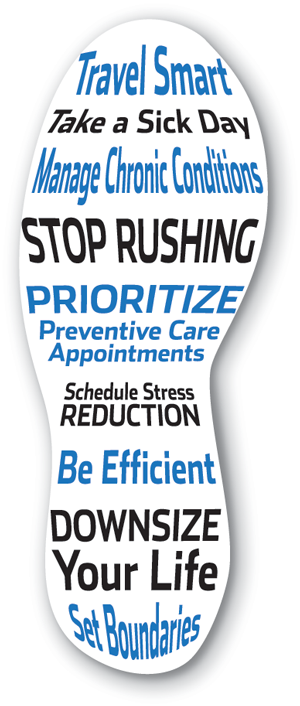Consider these 10 tips for feeling younger and healthier at work
Do you ever marvel at how fast the young employees at your company seem to move? Have you heard them chatting about watching late night television or having sipped martinis at the latest hip club into the wee hours of the morning? Despite this lifestyle, they still seem to have unlimited energy at work the next day.
Do you remember when you used to be like that? It’s not your imagination; you probably are moving a bit slower. As we get older, the body has less “bounce back” than it did when we were young.
Often as we age, we feel tired more often at work. Even older workaholics in love with their jobs may remember a time when they could work 18 hours every day and not feel the effects. These same driven career-oriented professionals are often surprised by their fatigue, which often leads to burnout.
How do we keep up with younger colleagues, subordinates and customers with seemingly unlimited energy, fresh ideas and appear to require little sleep?
Most people don’t realize some of the natural aging process begins around age 30. The need for sufficient sleep, good nutrition and exercise becomes more important every year once the aging process starts. Unfortunately for many of us, our responsibilities multiply in our middle age and older years, which increases stress, just during the time when we should be reducing it.
Taking care of children, assisting older parents, buying homes and increased career obligation often pushes good self-care to the lowest priority.
Consider these 10 tips for feeling younger and healthier at work:
 Treat Your Body Better
Treat Your Body Better
Would you skip routine maintenance for your older vehicle and expect it to continue running reliably? It’s startling how many responsible older workers wouldn’t dream of missing an oil change appointment for their car but don’t take time for lunch.
Eating healthy, exercising regularly, minimizing alcohol and caffeine consumption, drinking plenty of water and getting sufficient sleep is essential to keeping energy up. Treat your body at least as well as you treat your car.
Travel Smart
Travel often becomes more challenging on our bodies as we get older. If you’re a road warrior, have a suitcase and toiletry case prepared at all times with items you will need such as toothpaste, toothbrush, hairbrush and so forth.
Try to pad cross-country and cross-continental trips with an extra day or two to reduce the strain of jet lag. Stop regularly to stretch muscles during long car trips.
Take a Sick Day
Even if you simply have a cold, your immune system will thank you if you coddle yourself a little bit. Take a day to drink tea in bed while watching an old movie. If you truly have unavoidable deadlines, at least work from home.
The older workforce tends to see calling in sick as a sign of weakness, wanting to persevere even while under the weather. Taking a day or two off when you begin to feel sick often decreases the length of an illness because the rest allows your body to recover more quickly.
Manage Chronic Conditions
Chronic and acute conditions are not a normal part of the aging process, but they do occur more frequently as we get older. If you have diabetes, heart disease, sleep apnea any other chronic conditions, be sure to discuss with your doctor and see the appropriate specialists.
With the onset of chronic and acute conditions, older workers are more likely to be prescribed prescription medications. It is important to do a cost-benefit analysis with your doctor when considering taking a new drug. The decision to take medicine should always be weighed carefully because many drugs tend to have side effects that may impact our work performance and quality of life.
Take into consideration how side effects such as sleepiness, weight loss or gain, fatigue or memory issues may impact your job if it is necessary to take a drug that causes them.
Stop Rushing
Rushing from appointment to appointment is another surefire way to increase stress, which can exacerbate chronic conditions. Budget plenty of time to get to where you need to go.
Prioritize Preventive Care Appointments
Preventive care such as routine physical, dental, and eye exams should not be constantly rescheduled in favor of work obligations. Make it a rule that you will not reschedule a medical appointment more than once.
Schedule Stress Reduction
Obviously taking vacations and unplugging from work altogether is ideal. But regular yoga, massage, acupuncture and psychotherapy appointments can help manage stress when a vacation is not possible. Figure out a way to incorporate some relaxation into every single workday, even if it is only a few minutes of meditation.
Be Efficient
Wouldn’t it be great if you could get your job done in less time? If you have trouble delegating, take a course on how to work smarter. Ask others who seem to have a better work-life balance for their secrets.
Downsize Your Life
If you have a high-pressure job that is your priority, you may need to cut back on volunteer or even some personal obligations in order to have more energy at work. Keep a tickler file of activities and worthy volunteer opportunities to refer to when you retire and have more time.
Set Boundaries
If you don’t wish to be contacted on weekends unless it’s a true emergency, make sure you let people know. Often older employees feel they need to be plugged in at all times, especially if younger counterparts are — but everyone is entitled to set boundaries at their comfort level, especially during non-work hours.
Older workers often provide some of the most effective leadership and valuable contributions to the workplace. When good self-care and healthy boundaries are cultivated, older workers can expect their example, wisdom and experience to influence others even after they are retired.


 Treat Your Body Better
Treat Your Body Better